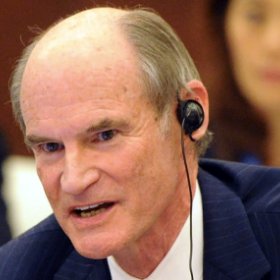
Cyber Summit Round Up: EWI Provides Premier Platform to Drive Change
The sixth annual Global Cyberspace Cooperation Summit, hosted by the EastWest Institute, completed its work in New York last week by making significant progress on key global cybersecurity issues.
On September 9-10, two hundred government, industry, and civil society participants from 40 countries pushed forward the adoption of: fact-driven, risk-informed, and transparent requirements to help information technology buyers acquire more secure products from global sources; rules of the road for the use of cyber weapons; and, streamlined procedures for fighting international cybercrime and protecting critical infrastructure. The summit, the sixth since 2010, was conceived and facilitated by Bruce McConnell, EWI's senior vice president who runs its global cyberspace cooperation initiative.
The results build on products developed by industry, including Huawei Technologies' report, "Cyber Security Perspectives: 100 requirements when considering end-to-end cyber security with your technology vendors," and Microsoft's "International Cybersecurity Norms, Reducing Conflict in an Internet-dependent World."
The participants also discussed future work to help manage the effects of ubiquitous encryption, address differing cultural understandings of "free speech," and promote new forms of organization to govern the Internet.
At the summit, Scott Charney, Microsoft's Corporate Vice President for Trustworthy Computing, noted, "The world needs a way to better manage cybersecurity risks. The answer lies in globally accepted cybersecurity norms of behavior for states, vendor transparency, and increased user control."
Tom Patterson, Vice President and General Manager, Global Security Solutions, Unisys, observed the need to "focus on critical infrastructure protection as one global issue, not small national issues."
"One big challenge in cyberspace discussions is the failure to take action on agreed common interests and principles," said Andy Purdy, Chief Security Officer, Huawei Technologies USA. "The EastWest Institute provides a premier platform to come together and drive change."
Retired Admiral William A. Owens, Chairman of the Board of Directors of CenturyLink, observed, "The challenges keep getting bigger as the rate of change accelerates. We can't wait for governments to act, the private sector must."
Echoing this view, Ambassador Cameron Munter, EastWest's CEO and President, noted at the end of the summit, "Our need for cooperation increases with each new breach, with each new app that millions come to depend on. As with so many hard global issues, we are all in this together."
EastWest's work to improve cooperation in cyberspace is supported by Microsoft, Huawei Technologies, Palo Alto Networks, NXP Semiconductors, Qihoo 360, Unisys, CenturyLink, and the William and Flora Hewlett Foundation. The summit was also co-hosted by the Munich Security Conference.

